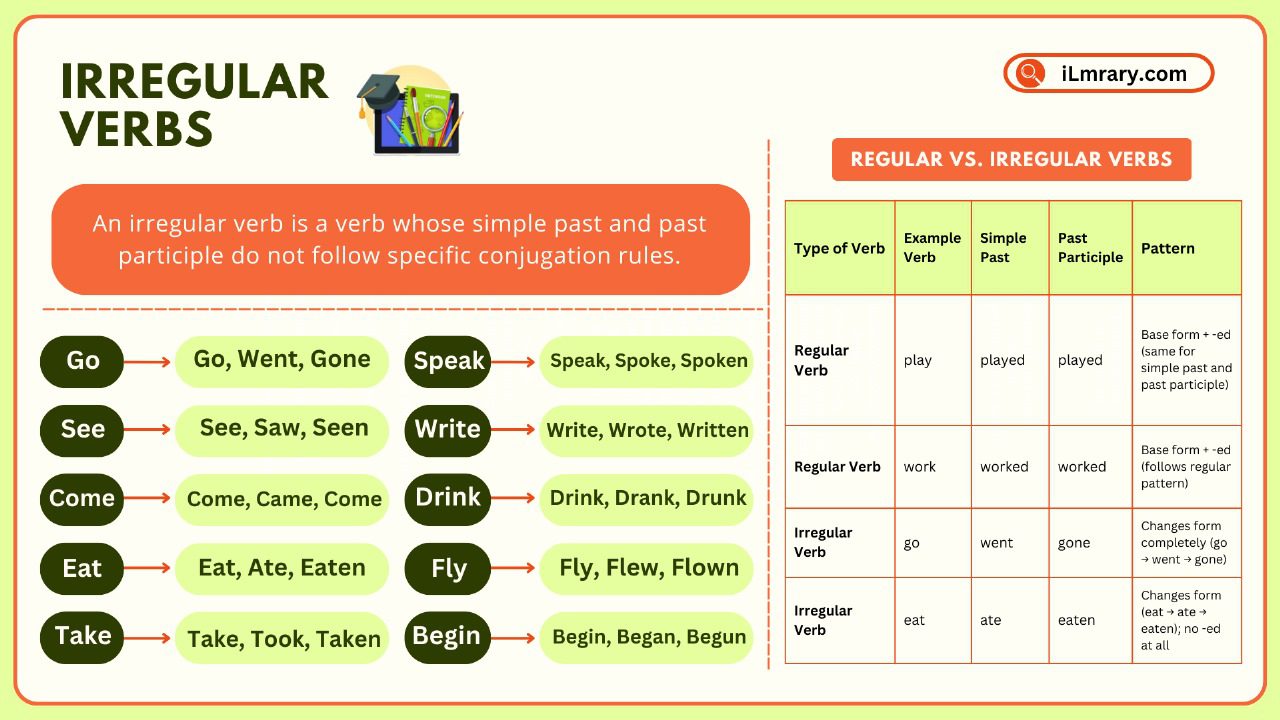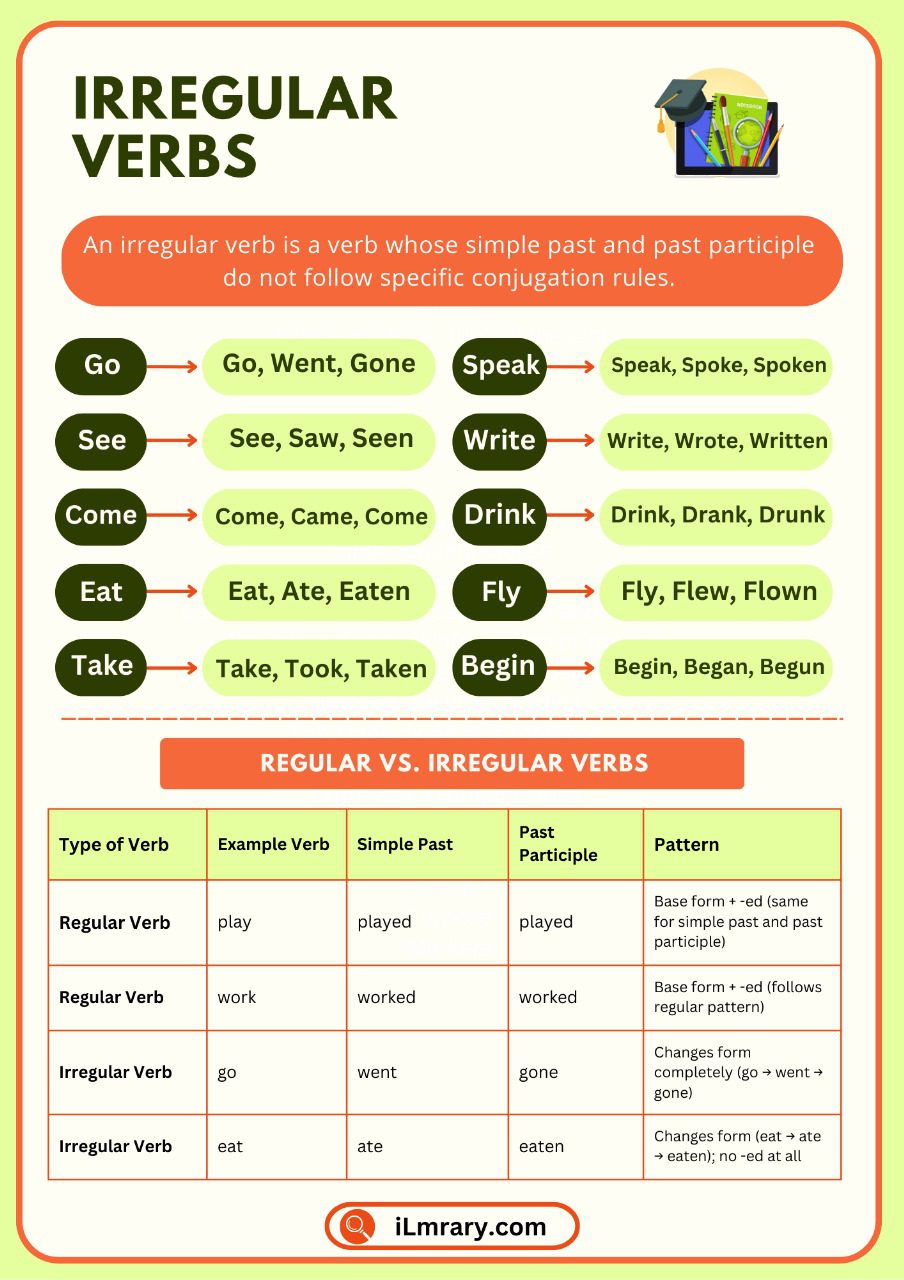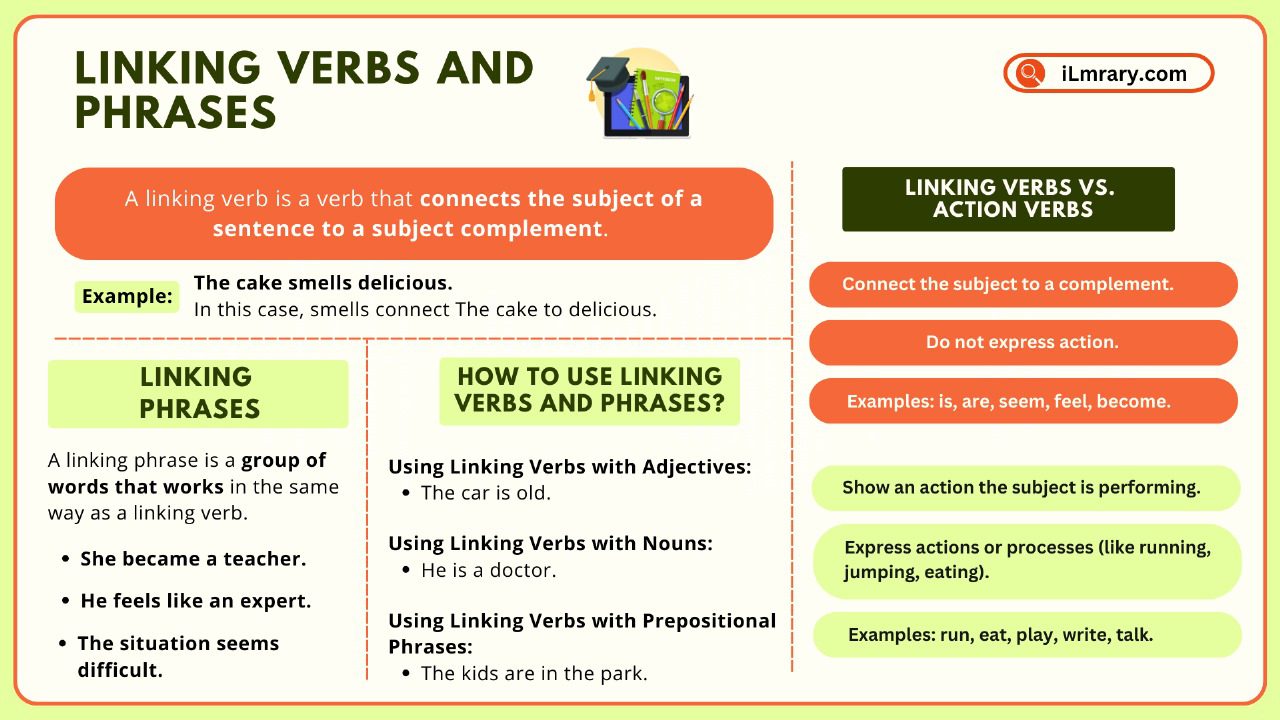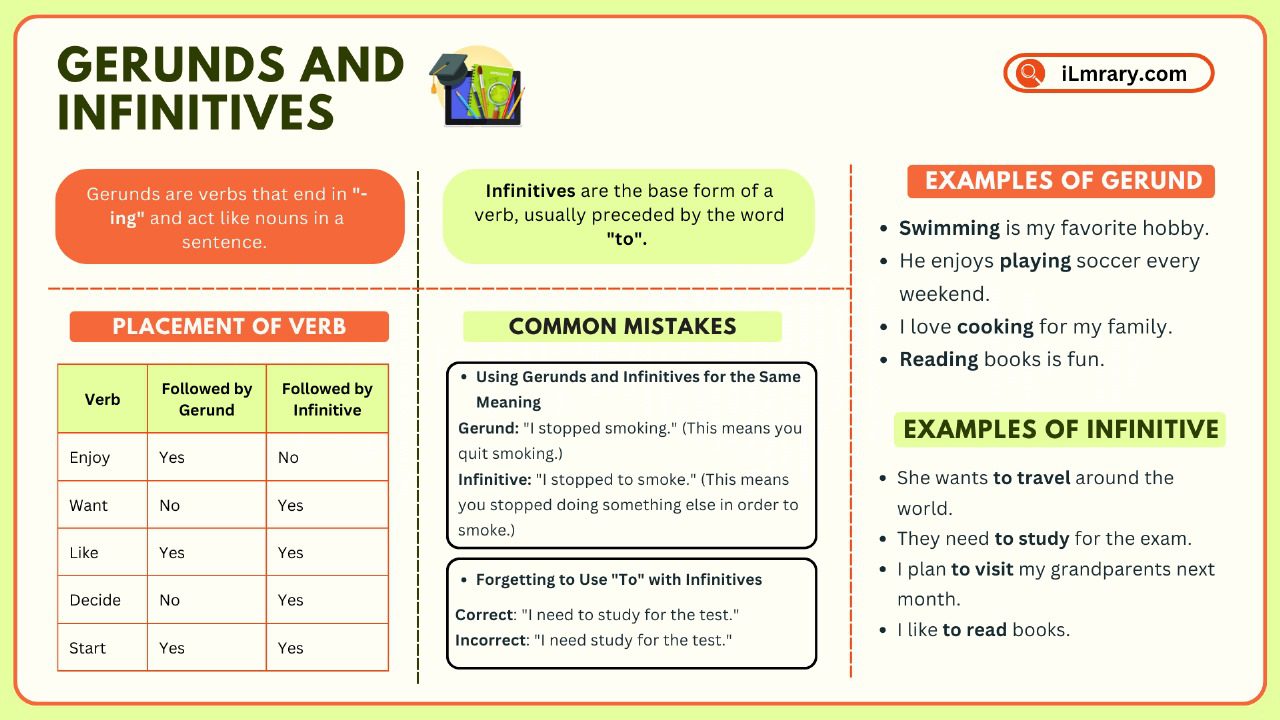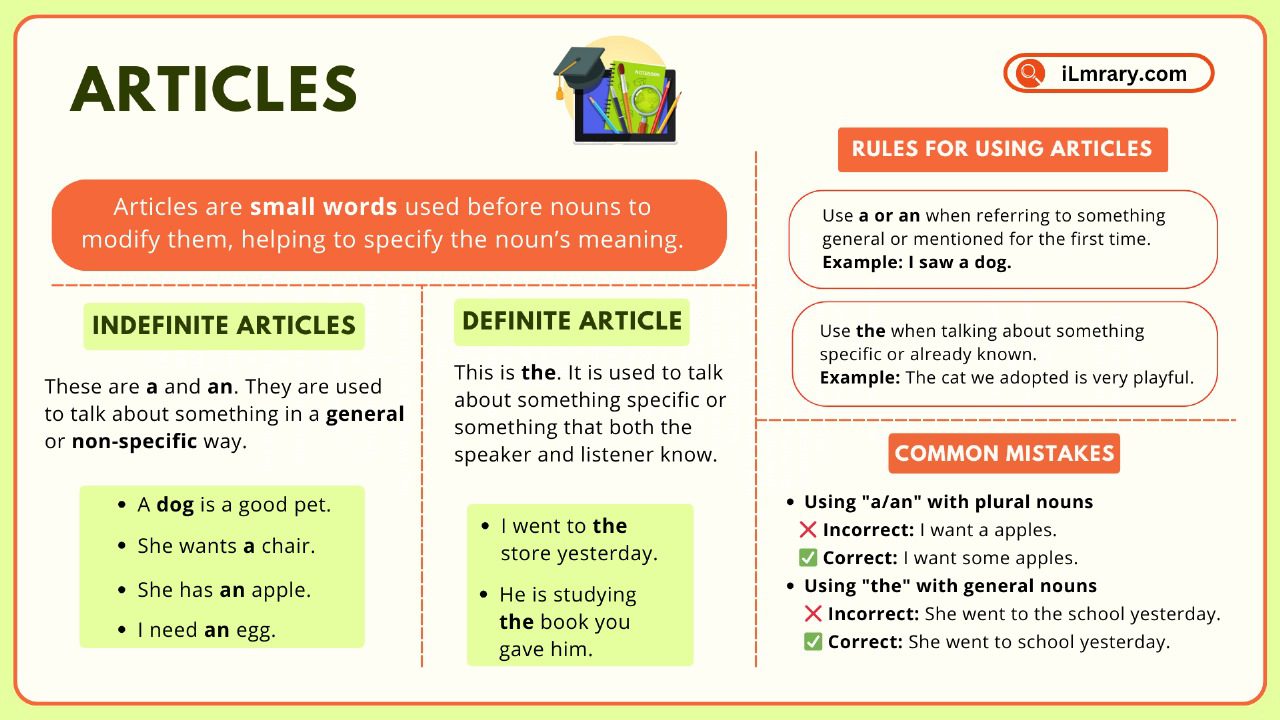One of the most confusing parts of English grammar is dealing with irregular verbs. Irregular verbs in English are those that do not follow the usual “-ed” pattern when their form is changed in a different tense. Instead, they change in different ways, or sometimes not at all.
But do not worry! In this article, we will discuss what irregular verbs are, how they differ from regular verbs, and share simple methods to help you master them. By the end, you will have a clear and friendly overview of irregular verbs, complete with easy examples and tips you can start using right away.
Contents
What are Irregular Verbs?
Common Irregular Verbs With Examples
There are dozens of irregular verbs in English, but certain ones appear more often in everyday speech and writing. So, let us focus on some very common irregular verbs. For each verb, we will list the base form, simple past, and past participle, followed by a quick example sentence for each tense.
1 – Go
“Go” is used to talk about moving or traveling from one place to another.
- Present: “I go to school every morning.”
- Past: “I went to the cinema yesterday.”
- Past Participle: “I have gone there several times this year.”
2 – See
“See” is about noticing or viewing something with your eyes.
- Present: “I see a bird outside my window.”
- Past: “I saw a beautiful painting at the gallery.”
- Past Participle: “I have seen many wonderful sights in my travels.”
3 – Come
“Come” is used when someone arrives or moves closer to where you are.
- Present: “I come here every afternoon to read.”
- Past: “I came here yesterday for a study session.”
- Past Participle: “I have come to this café since I was a child.”
4 – Eat
“Eat” refers to consuming food or having a meal.
- Present: “I eat breakfast at 7 AM each day.”
- Past: “I ate an orange for lunch.”
- Past Participle: “I have eaten at this restaurant twice before.”
5 – Take
“Take” often means to pick something up, carry it, or use it for yourself.
- Present: “I take notes in my English class.”
- Past: “I took a bus to the city center last week.”
- Past Participle: “I have taken many pictures during my vacation.”
6 – Speak
“Speak” is about talking or communicating with words.
- Present: “I speak English with my friends after class.”
- Past: “I spoke to my teacher about my progress.”
- Past Participle: “I have spoken with my siblings about our plans.”
7 – Write
“Write” deals with putting words on paper or typing text.
- Present: “I write in my diary before bed.”
- Past: “I wrote a short story for my assignment.”
- Past Participle: “I have written many letters to my grandmother.”
8 – Drink
“Drink” is used when you consume liquids, such as water or juice.
- Present: “I drink water regularly to stay hydrated.”
- Past: “I drank a cup of coffee this morning.”
- Past Participle: “I have drunk orange juice every day this week.”
9 – Fly
“Fly” means traveling through the air, either by plane or by wings.
- Present: “I fly to different cities for business.”
- Past: “I flew to New York last summer.”
- Past Participle: “I have flown with various airlines over the years.”
10 – Begin
“Begin” is about starting something, like a task or activity.
- Present: “I begin my homework right after dinner.”
- Past: “I began learning English two months ago.”
- Past Participle: “I have begun to enjoy grammar more each day.”
Regular vs. Irregular Verbs: Comparison Table
Sometimes, seeing a side-by-side example helps you grasp the concept more clearly. Below is a table that shows regular verbs and irregular verbs in their base form, simple past, and past participle. Also, notice the major differences in how they change across tenses.
| Type of Verb | Example Verb | Simple Past | Past Participle | Pattern |
| Regular Verb | play | played | played | Base form + -ed (same for simple past and past participle) |
| Regular Verb | work | worked | worked | Base form + -ed (follows regular pattern) |
| Irregular Verb | go | went | gone | Changes form completely (go → went → gone) |
| Irregular Verb | eat | ate | eaten | Changes form (eat → ate → eaten); no -ed at all |
Common Mistakes
Even after learning the basic forms, many learners still make small mistakes when using irregular verbs. Here are some important issues to keep in mind:
FAQs:
- What is the best way to memorize irregular verbs quickly?
There is no single best method for everyone, but flashcards, daily practice, and mini-stories often help. Additionally, try different approaches, like writing them down, speaking them out loud, or using apps, to see which method works best for you.
- How many irregular verbs are there in English?
Different sources list different numbers, but many commonly used lists identify around 200 to 300 irregular verbs. So, focus on the ones you hear and see most often, like go, see, eat, speak, and take.
- Why do some irregular verbs remain the same in past tense and past participle?
Some verbs like cut, put, and set do not change spelling. This is due to historical reasons and how English evolved over time. In addition, these verbs happen to retain older forms that never adopted the -ed ending.
- Can I use the same approach for both regular and irregular verbs?
In many ways, yes. Regular practice, reading, listening, and speaking help with all verb types. Unlike regular verbs, for irregular verbs, you should pay extra attention to memorizing their forms since they do not follow a single rule.
- Why is it important to learn irregular verbs early in my English studies?
Irregular verbs are used frequently in everyday communication. So, learning them early helps you understand native speakers better and allows you to speak and write more accurately. Moreover, it also boosts your confidence when forming sentences on your own.
Conclusion:
To sum up, irregular verb is an interesting part of English grammar. While they can seem like an obstacle at first, they are simply a product of English’s rich history. So, by focusing on the most commonly used irregular verbs, using practical tools like flashcards, and regularly practicing in both written and spoken form, you will begin to feel more comfortable with them.
The path to mastering irregular verbs can be enjoyable if you turn practice into a regular habit. So, stay patient with yourself, celebrate small successes, and you will steadily gain the confidence needed to use irregular verbs correctly.
You May also like:


